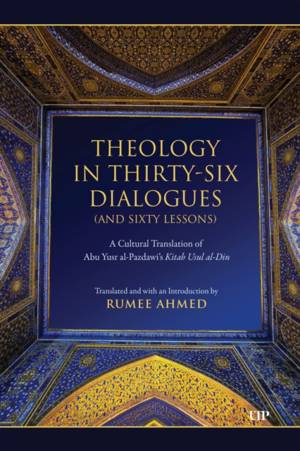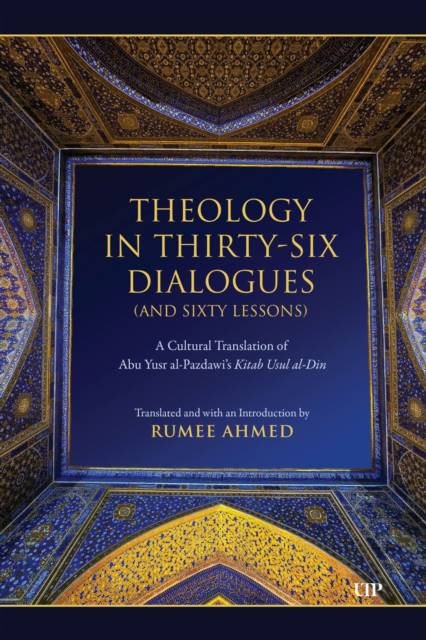
- Afhalen na 1 uur in een winkel met voorraad
- Gratis thuislevering in België vanaf € 30
- Ruim aanbod met 7 miljoen producten
- Afhalen na 1 uur in een winkel met voorraad
- Gratis thuislevering in België vanaf € 30
- Ruim aanbod met 7 miljoen producten
Zoeken
Theology in Thirty-Six Dialogues (and Sixty Lessons)
A Cultural Translation of Abu Yusr Al-Pazdawi's Kitab Usul Al-Din
Abu Yusr Al-Pazdawi
€ 70,95
+ 141 punten
Omschrijving
Late in the 11th century, renowned Hanafi scholar Abu Yusr al-Pazdawi wrote a theological treatise that became one of the most celebrated books in Muslim history. This book is the first English translation of that manuscript, Kitab Usul al-Din.
Written in a highly accessible style, Kitab Usul al-Din introduces readers to theology through conversations on some of the most important theological issues in history: Why did God create us? Where do we go when we die? What makes someone a good person? Does God love us? Al-Pazdawi situates central issues in Islamic thought within a series of dialogues and debates, and challenges readers to draw their own conclusions.
Presented here for the first time in English, Theology in Thirty-Six Dialogues (and Sixty Lessons) offers al-Pazdawi's text as a foundational introduction to Islamic theology for English speakers. Islamic studies professor Rumee Ahmed begins each dialogue with brief contextualizing notes that familiarize readers with the topics under discussion. Staying true to al-Pazdawi's call-and-response style, Ahmed's translation is presented as a series of acts and Socratic dialogues that preserve the performative nature of the original and engage the reader in a dynamic way.
Putting forth a reflective and unprecedented translation, this book invites readers of all backgrounds to engage with the most vital issues in Islamic thought.
Written in a highly accessible style, Kitab Usul al-Din introduces readers to theology through conversations on some of the most important theological issues in history: Why did God create us? Where do we go when we die? What makes someone a good person? Does God love us? Al-Pazdawi situates central issues in Islamic thought within a series of dialogues and debates, and challenges readers to draw their own conclusions.
Presented here for the first time in English, Theology in Thirty-Six Dialogues (and Sixty Lessons) offers al-Pazdawi's text as a foundational introduction to Islamic theology for English speakers. Islamic studies professor Rumee Ahmed begins each dialogue with brief contextualizing notes that familiarize readers with the topics under discussion. Staying true to al-Pazdawi's call-and-response style, Ahmed's translation is presented as a series of acts and Socratic dialogues that preserve the performative nature of the original and engage the reader in a dynamic way.
Putting forth a reflective and unprecedented translation, this book invites readers of all backgrounds to engage with the most vital issues in Islamic thought.
Specificaties
Betrokkenen
- Auteur(s):
- Vertaler(s):
- Uitgeverij:
Inhoud
- Aantal bladzijden:
- 378
- Taal:
- Engels
- Reeks:
Eigenschappen
- Productcode (EAN):
- 9781487575618
- Verschijningsdatum:
- 24/03/2026
- Uitvoering:
- Hardcover
- Formaat:
- Genaaid
- Afmetingen:
- 152 mm x 229 mm
- Gewicht:
- 512 g

Alleen bij Standaard Boekhandel
+ 141 punten op je klantenkaart van Standaard Boekhandel
Beoordelingen
We publiceren alleen reviews die voldoen aan de voorwaarden voor reviews. Bekijk onze voorwaarden voor reviews.







